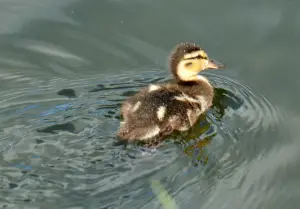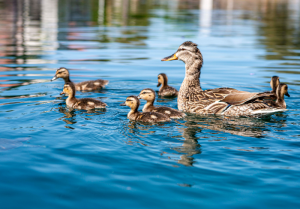Can Baby Ducks Swim?
When water is provided, domestic ducks spend an average of 10% of their day swimming. You may think that swimming comes as naturally to ducks as breathing but read on before throwing your ducklings into the pond for a dip.
Can baby ducks swim? Baby ducks, or ducklings, are born knowing how to swim. They need to be supervised closely when they are young however, due to their higher chance of becoming waterlogged, the risk of becoming too cold, and the fact that they will easily become fatigued.
Before you skip to learning how to introduce your ducklings to the water, it is important to understand how the feathers and oil glands of ducklings differ from adult ducks. Read on to learn more about how a duck’s feathers prevent her from getting waterlogged, how ducklings in the wild learn to swim, and how you can safely introduce your ducklings to water.
Why Baby Ducks Can Find It Harder To Swim
There are a few different ways that a duck’s body helps it to stay afloat for long periods of time. One of these advantages is the uropygial gland, or the preening gland. This oil gland is located at the base of a duck’s tail, and secretes an oil that waterfowl use to waterproof their feathers.
We all know that oil and water do not mix. After a duck has fully oiled its feathers through preening, it is more difficult for water to penetrate through the feathers to reach the duck’s skin. While ducklings are born with this special oil gland, it is not fully functional until between 4 and 8 weeks of age.
How Do Ducks Oil Their Feathers?
You will find that ducks spend a significant amount of time preening themselves. While we might joke about preening being associated with vanity, ducks are being anything but vain when they preen themselves. A duck will press their bill into the uropygial gland to secrete this special oil and will use the small, flexible combs in its bill to spread the oil all over its body and through its feathers.
When a duckling is hatched by a mother duck, the mother will use her own oil to waterproof her ducklings. This gives them an edge over ducklings hatched with an incubator. While this means you will need to be even more careful when introducing orphan ducklings to water, don’t let it discourage you – research has shown that early introduction to water encourages preening and oil production in ducklings. This means that the earlier you introduce your ducklings to water, the earlier they will be able to swim on their own.
When Are Baby Ducks Introduced To Water In The Wild? 
As we’ve established, ducklings hatched by a mother duck are at a waterproofing advantage when compared to ducklings hatched through the use of an incubator. Because of the mother duck’s grooming and supervision of her babies, ducklings in the wild are able to swim soon after birth.
For the first ten days, a set of ducklings will stay close to one another and close to their mother – both in and out of the water. Ducklings are born with an innate sense of self-preservation and are particularly vulnerable to predators on the ground, in the air, and in the water. By sticking close to one another, they increase their chances of survival.
How To (Safely) Introduce Baby Ducks To The Water
When to introduce your ducklings to the water is a personal choice. Some begin the introduction as early as 3 days of age, and some wait until the ducklings are 8 weeks or older. The argument can be made that if done safely, the earlier, the better.
Ducklings introduced to the water earlier will have a jump start on preening behavior and the waterproofing of their feathers – and they enjoy it. Following a few ground rules, you should be able to introduce your brand new ducklings to the water safely.
Supervise Your Ducklings
When you are first introducing your ducklings to the water, things can take a turn for the worst very quickly. It is crucial that you always have an eye on the ducklings when (and shortly after) they are in water and a close eye at that.
You may find your ducklings excitedly flapping in the water when they are first introduced and exhausted mere minutes later. It may be helpful to have a second person on hand when first introducing the babies to the water in case one of you is pulled away to answer the phone, let the dog out, or even to grab a towel.
Keep Your Ducklings Warm When Introducing Them To Water 
There are a couple of reasons that your duckling will have a more challenging time keeping himself warm than an adult duck. We’ve already discussed how important it is for a duck to keep his feathers oiled – when the water penetrates through the duck’s feathers, it not only makes him heavier, but it will also make him colder as the water comes into contact with his skin.
And as ducklings are born with down feathers, they will have a harder time regulating their body temperature anyway than a mature duck who has adult feathers.
It is vitally important, therefore, to make sure that your ducklings do not get too cold. While a mature duck can handle water much colder than you or I would want to enter, you will need to keep the water warm, or tepid, for your duckling’s first few swims.
Once they are ready to get out, transfer them directly to a warm towel and place them back in the brooder under a heat lamp. If they start preening, wonderful. If they are shivering and appear cold, you can use a hair dryer on low to speed the warming process.
Keep Your Ducklings From Tiring
Your duckling’s stamina for swimming will increase with exposure. During the first few swims, however, you may find her tiring after only a couple of minutes – this is one of the reasons it is so important to keep a close eye on your ducklings in the water. You will notice them tiring as they stop playing and stay still. As soon as you notice this, it is time to give them a break.
You will want to keep the water quite shallow in the beginning. This way, your ducklings can paddle around if they have the energy, but can simply stand still with their feet touching the ground if they are tired. You will notice them tiring quite quickly in the early days – this is okay, follow their lead – before long they will want to spend all day in the water.
Other Tips For Raising Baby Ducks
Ducklings are relatively easy keepers, but there are a few things that you will need to keep in mind to give them the best start.
Keeping Ducklings Warm
Until a duck has all of her adult feathers, she will need some help regulating her body temperature. Young ducklings will need supplemental heat, typically supplied in the form of a heat lamp.
Make sure to practice safety when using a heat lamp, ensuring that it is secured and cannot fall into the brooder (some accomplish this by using two forms of securing or by placing a metal cage between the brooder and the lamp).
Your brooder is at the correct temperature when your ducklings look comfortable and are moving around. If your ducklings are huddled tightly together, you need to lower the heat lamp to supply more warmth to the brooder. If your ducklings are sprawled out near the outer edges of the brooder, they are likely too warm, and you should raise the lamp.
If you are raising them in colder weather, you can begin to wean them from the heat lamp by turning it off during the day once they are growing adult feathers and turning it back on at night. If you are raising them in warmer weather, you may not need the heat lamp at all after the first few weeks.
Providing Drinking Water To Your Ducklings 
Your baby ducks will find their way to food as it is provided, but it is very important that they familiarize themselves with where the drinking water is from the start. When you place your new ducklings in the brooder, you need to use your hands to manually place each duckling’s bill into the water.
Watch to see if they lift the heads after this to swallow. Keep a close eye on the ducklings during the first day to make sure they are all visiting the water dish and getting enough to drink. If not, you can again place their bills in the water manually until they “get it”.
Keeping Baby Ducks Healthy
There is no doubt that ducks love to swim – both in the wild and in captivity. Many keepers believe that to raise the healthiest, happiest ducks, you should encourage natural behaviors as much as you can. By providing safe bath time from an early age, you are mimicking what they would do in the wild under the care of their mother.

